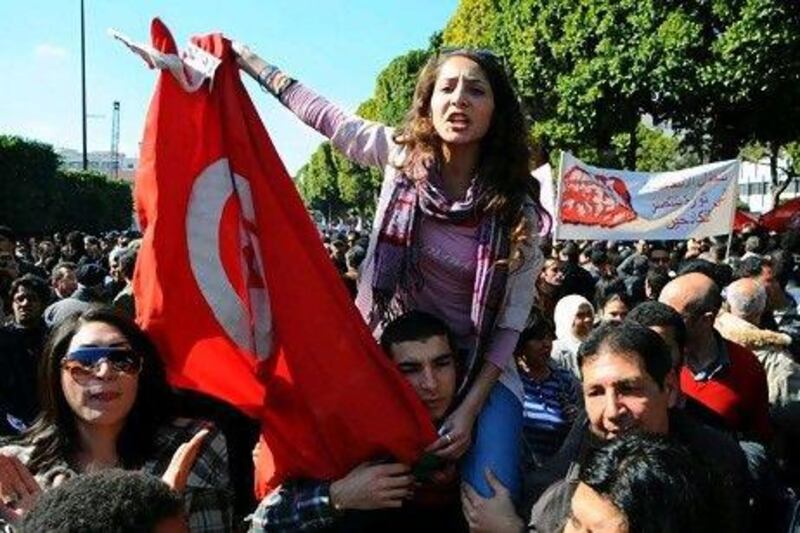During the past year, the Arab world has gone through historic transformations. On top of the mounting death toll, the uprisings have engendered significant economic costs.
A year later, the euphoria of overnight democratic change has given way to the more pragmatic challenges of transition. Much emphasis has been placed on the political aspect of these popular revolts, and while this facet is undoubtedly of utmost importance, one should be mindful that these uprisings have also brought economic, financial and social problems yet again to the forefront.
These dimensions had a central role in triggering the desire for democratic change across the region and will help to determine the sustainability of this new Arab order.
The Group of Eight leading industrial nations has attempted to guide this rapidly evolving Middle East in a favourable direction by engaging with opposition groups at a time when it still had leverage, rather than later, after newly elected representatives were in power.
But, given the challenges at hand, international support has fallen far short of expectations. Opponents of IMF support claimed that aid packages were unevenly extended and denounced tough conditions. As an alternative, they called for investment of Arab liquidity within the region.
With the exception of Libya and Syria, the response of the Arab League, Arab Monetary Fund and other Arab organisations has been, not surprisingly, quasi-absent, reinforcing the lack of leadership in the region, its inefficient institutional functioning and the reliance on western support and patronage.
In my view, we are not being sufficiently alarmist in drawing attention to the fact that the combination of the global economic crisis, a lack of liquidity for unanticipated expenditures and overwhelming demands on the same sources of funding suggests that nascent Arab revolutions will not receive sufficient external financial support to meet their needs. If we do not plan for contingency funds that are used wisely, the region risks further destabilisation that will in turn cause further political, social and economic distress.
In a nutshell, growth last year in the Middle East and North Africa region (Mena) was distressed by the disruption of activity, the reduction of investment, the fall of foreign investment inflows coupled with capital flight and lower tourism receipts.
At the same time, surging global commodity prices have pushed governments to respond by increasing spending, including on wages, food and fuel subsidies, which increased fiscal deficits.
As a result, forecasts of economic activity for the Mena region have been revised downwards.
Ratings agencies have also revised their sovereign ratings to account for the increased political risk. In line with deteriorating investor confidence, sovereign credit default swap spreads have widened and countries' borrowing costs in international markets have increased.
In the context of delayed political transition awaiting the outcomes of elections in some countries and prolonged conflicts in others, the main risk in the medium term would be the inability to re-establish confidence and anchor investors' expectations.
The problem facing Tunisia, Egypt, Libya and other countries is that given today's uncertainty, the amount of funding they need to cover external deficits and public financing is growing, while their borrowing costs are increasing steeply.
Restoring confidence is greatly dependent on political outcomes. Will the uprisings lead to democracies, freedom and accountability, or will they merely replace rulers? Will the uprisings be limited to just a handful of countries or will they spread further in the region? Even though oil-producing countries have benefited in the near term and transitional countries have deteriorated, the future for all remains uncertain.
It is imperative that each nation seize this unique opportunity to establish a mix of measures to address deep-rooted national challenges.
No matter what political system emerges from these uprisings, it should restore the social contract and translate into citizen empowerment by reaching out to long-overlooked civil-society parties such as academics and NGOs and by reducing the gender-representation gap to increase women's economic participation. Structural reforms to governance and social protections are also needed. Governance reforms are expected to improve the conditions for doing business by reducing barriers to entry and increasing transparency.
In the quest to fulfil potential economic growth, Mena countries should try to take advantage of the large regional market and geographical location to support greater global integration; to diversify their economies and rid themselves of dependence on oil revenues through entrepreneurship; and to reform their educational systems to nurture talent and spur innovation.
Growth will then generate enough private-sector jobs to support a fast-growing labour force.
The Arab awakening is more about transformation than revolution. The key is that economic and social transformations occur alongside political ones. The quest for civil and political freedoms and rights goes hand-in-hand with greater economic freedom. Economic potential and development can flourish only with greater political freedom and civil rights.
Raed H Charafeddine is first vice governor of Banque du Liban. He is the keynote speaker at a policy breakfast today organised by the Innovation and Policy Initiative of INSEAD Abu Dhabi and Konrad-Adenauer-Stiftung, Regional Program Gulf-States





